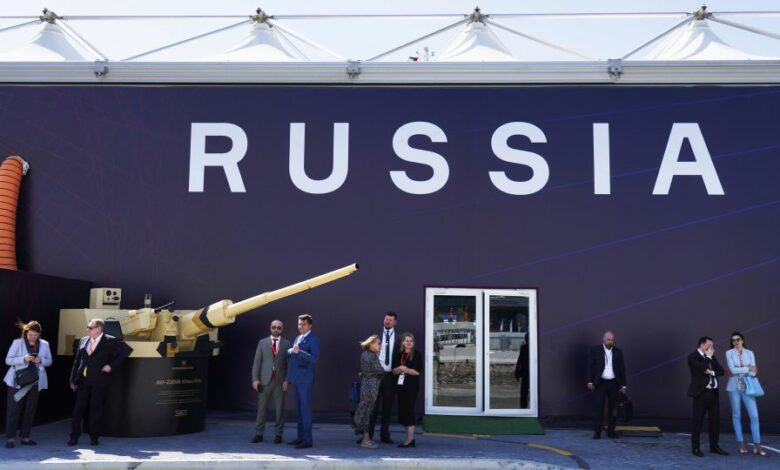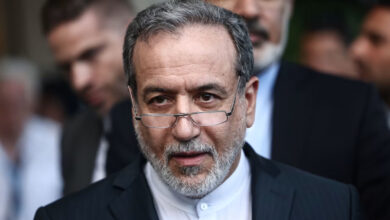
The biennial International Defence Exhibition (IDEX) in the UAE capital Abu Dhabi is the largest defense conference in the Middle East, with the participation of over 1,300 exhibitors from 65 countries.
But what makes it stand out from other major arms fairs is its participants. Invitees include military officials and manufacturers from countries that aren’t friendly with each other. Delegates from China and the United States, Russia and Ukraine, India and Pakistan, and Israel and Arab states are present at the same event.
Eight Russian arms manufacturing firms were exhibiting at the fair, including Kalashnikov Group and Rosoboronexport. In a statement to CNN, IDEX said it was “proud that this year’s edition is the largest in the event’s 30-year history.”
Russia has participated in the exhibition before, but this year, its presence is particularly sensitive.
One year since Russia launched its war on Ukraine, the UAE’s balancing act at IDEX demonstrates a wider policy across the Middle East of discreet neutrality, as well as the United States’ inability to sway its Middle Eastern allies to join the Western camp.
“It has been clear since the start of the Russian invasion a year ago that America’s regional partners in the Middle East… were not going to take sides or get involved in the great power competition and strategic rivalry that has taken on a harder edge since 2022,” said Kristian Ulrichsen, a political scientist at Rice University’s Baker Institute in Houston, Texas.
“So, to that extent the US has failed in getting its regional partners to take sides,” he said.
Energy-rich Gulf states have benefited from the rise in prices brought by the war in Ukraine, which has added tens of billions of dollars to their coffers. All six members of the Gulf Cooperation Council, which includes Saudi Arabia, Oman, the UAE, Kuwait, Qatar and Bahrain, registered budget surpluses in 2022 for the first time in eight years. Saudi Arabia’s alliance with Russia in the OPEC oil cartel has also allowed it to have better control over global crude prices, in defiance of the US.
In the UAE, the real estate market in Dubai boomed as Russians flocked into the regional business hub, buying property and starting businesses.
Russians also became Turkey’s top foreign buyers of real estate last year, according to the Turkish news outlet Daily Sabah, citing data by the Turkish Statistical Institute.
Strategic ambiguity
“So far, it is very clear to them (Middle East states) a year after the isolation of Russia that picking sides would not be in their interest and so they still very much refuse to do so,” said Cinzia Bianco, a research fellow at the European Council on Foreign Relations.
Most Gulf states have remained ambiguous and “cherish that strategic ambiguity,” she said at an event hosted by the Gulf International Forum. They have been “hedging since day one of the war,” she added.
But the US has indicated of late that its patience with its allies is running thin, saying the days of doing business with both Russia and the West are over.
The Biden administration has been ramping up pressure on its Middle East partners to choose between Russia and the West, singling out the UAE and Turkey in particular.
A US Treasury Department delegation visited both countries late last month to warn them against helping Russia evade sanctions, threatening to block their access to G7 markets they fail to comply.
Following the visit, the UAE said that it had discussed measures of combatting money laundering and the financing of terrorism with its US partner, and that “both governments have witnessed significant advances.”
After meeting US Secretary of State Antony Blinken in Ankara on Monday, Turkish Foreign Minister Mevlut Cavusoglu said that while his government doesn’t partake in “unilateral sanctions,” it will not allow US and European sanctions to be violated via Turkey.
On Tuesday, Deputy Secretary of the Treasury Wally Adeyemo acknowledged that Russia’s economic data “appears to be better than many expected early in the conflict,” but pledged to double down on efforts to get other states to comply with sanctions.
“We will force those that fail to implement our sanctions and export controls to choose between their economic ties with our coalition of countries – representing more than half of the world’s GDP – or providing material support to Russia, an economy that is becoming more isolated every day,” he said.
Mohammed Baharoon, director of the Dubai Public Policy Research Center, known as B’huth, said that polarized language of West-versus-Russia is problematic and “dangerous in the long run.”
“There’s a new wall being erected, and I think this is the real problem,” he told CNN, adding that increasing US pressure on Gulf states will not help Russia, the US or the UAE.
“Until now, the position of the UAE, the position of Saudi Arabia and others, has been to find a compromise, to find mediation efforts between the two countries to bring peace,” he said.
Ulrichsen of Rice University said that the UAE is likely watching American language on sanctions evasion closely in case it materializes into action.
At the defense show in Abu Dhabi, the Russian stall was busy, with visitors in traditional Arab clothing seen taking interest in what the Russian arms industry had to offer. CNN approached delegations from three different Russian firms, as well as an organizer of the Russian pavilion, but all refused to speak.
Rosoboronexport, a firm that makes drones and missiles, however, said in a press release last week that it is “busy working out proposals for the forms of partnership that could be of immediate interest to Middle East nations.”
“Middle East countries are Russia’s traditional and important partners,” its director general, Alexander Mikheev, was cited as saying.
The ECFR’s Bianco, however, cast doubt over Middle Eastern interest in Russian weapons.
“It has become clear in several (Gulf) capitals that Russia’s invasion of Ukraine has exposed the lack of quality in the performance of Russian weapons, and the low levels of the Russian defense industry,” she said, adding that Gulf states would now be even more reliant on NATO countries for defense procurement.
This story has been updated. A previous version of the story incorrectly stated that Russian arms manufacturers were not on the list of exhibitors.




